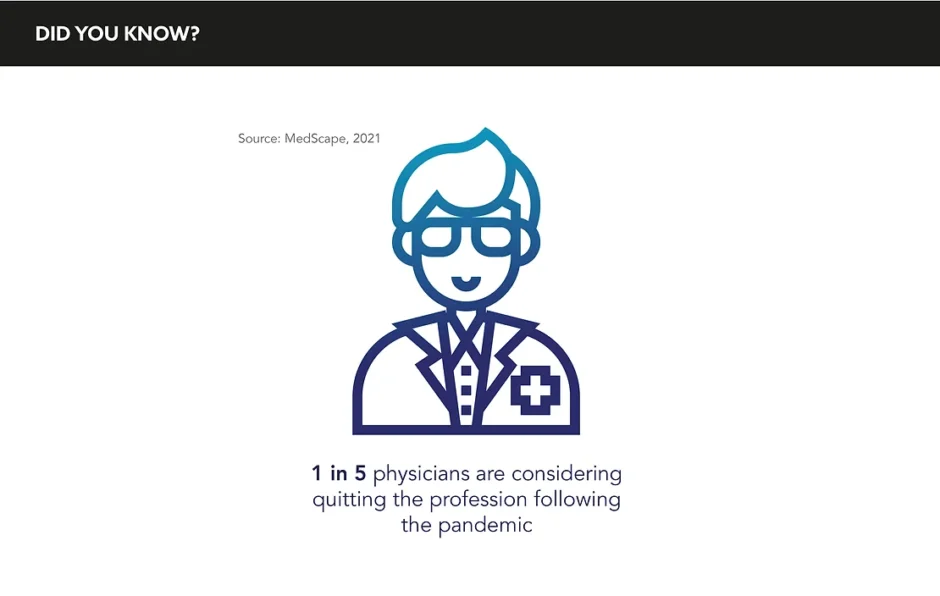While the medical affairs function is already filled with its fair share of physicians, the pandemic has exacerbated burnout, and career switches are on the minds of many. What is it like to switch from medicine to MA, and are we about to see this spike in the wake of COVID-19?
Words by Isabel O’Brien
While the safest place to have a heart attack is undoubtedly in the halls of a hospital or GP surgery, survival chances remain high if you were to drop to the floor of a medical affairs department. Medical graduates and practicing physicians have long been making the jump from medicine to MA, but as feelings of burnout and helplessness linger for frontline physicians, will more choose to make the leap in the coming months and years?
A recent report by MedScape has found that 42% of physicians have reported feeling burned out towards the latter part of 2020. The therapy areas ranking highest include critical care, rheumatology, and infectious diseases. While the emotional stresses of the pandemic reign as significant, “the entire medical system has evolved due to changes brought on by the COVID epidemic,” says Gregory Friberg, M.D, Vice President of Medical Affairs, Europe, Latin America, Middle East, Africa, Canada (ELMAC), Amgen, and former Oncologist, The University of Chicago. The evolution of the healthcare system itself has presented challenges, but also opportunities for those who want to play a role in guiding the transformation.
While adjusting to new technologies and processes can be tricky, many physicians are excited by the possibilities of new pathways and are looking to guide industry in the present overhaul. “The role of the MA profession to help smooth the transition of these new technologies into the world will be key,” says Friberg. “Well-trained physician-scientists are needed to make this happen, and I suspect there will be more opportunities for physicians looking to enter MA or clinical development within industry.” This doesn’t just apply to telehealth, but also the advancements that have been seen in rapid drug development and mRNA.
An increased interest in public health will also be a leading factor in the switch. “I potentially see an influx of doctors from practice into industry as part of a bigger trend of physicians becoming more willing to contribute to public health,” says Luca Dezzani, Franchise Head, US Oncology Medical Affairs, AstraZeneca, who worked as a physician for over 15 years. While public health has always been an important driver for doctors, in the past, specialities have taken over, but a desire to work in public health has grown since COVID-19, demonstrating how delicate the equilibrium of this can be.
“The pandemic has shown us all what scientific innovations like vaccines can do for public health globally and what we can achieve as an industry when we collaborate with an agile mindset,” says Charlotte Kremer, Executive Vice President, Head of Medical Affairs, Astellas Pharma, who trained as a physician before beginning a career in MA. She explains that the need to publish advanced data and educate external stakeholders is “crucial to this success”, stating: “I truly hope this will provide an influx of talented, ambitious and passionate new colleagues in MA, as well as in Clinical Development.”
If doctors are keen to leave the frontlines behind, they will discover that they already possess the essential skills to succeed in an MA role. “Being a medical professional means that I better understand what patients go through, and the hurdles that they face along with their caregivers,” says Friberg. This is especially true when it comes to communicating essential medical information to potential and existing customers. “If you have been a health provider at some point, you know what good looks like, and you know what the pain points in your work are,” says Dezzani. With Kremer adding: “My medical training has been a great foundation for my career. It gave me the perspective to really put the patient at the centre of everything we do, which is so critical in our industry.”
The only warning comes from Dezzani, who urges that while this trend has been seen for a long while, not all physicians will find they attain the same amount of satisfaction from MA as they do from direct work with patients. “A significant number of colleagues move from clinical practice into the industry, but then for one reason or another, they move back because they don’t like it, or they don’t find it a good fit for them.” He urges that the reason he stayed was due to cross-functional work of pharma. Concluding: “If we want better healthcare, it’s not only going to be doctors driving that change. We need all the healthcare stakeholders to be involved in that.
While talent is brimming in the MA function, there is no doubt that as we enter one of the vastest healthcare overhauls of recent times, an increase in doctors in the field would be a benefit rather than a hinderance to outcomes and activities. “I cannot imagine being able to do the job I do without those many years of training to be a physician,” concludes Friberg. If more physicians realise their value in this space, MA may be about to have more doctors in the house than ever before.










